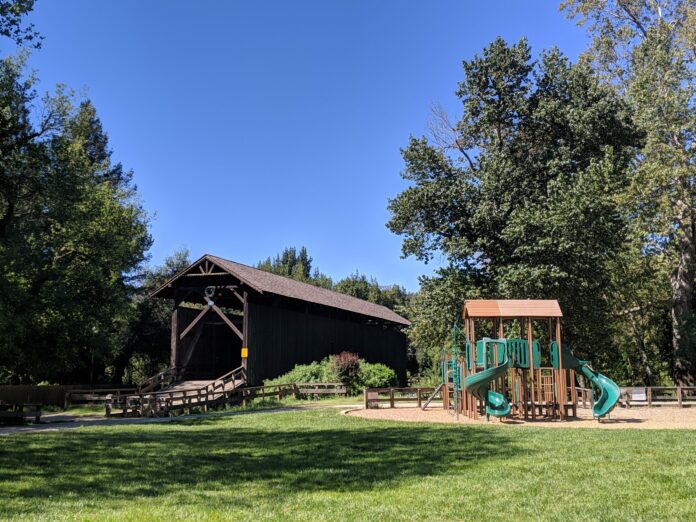The Harm Reduction Coalition of Santa Cruz County, Harm Reduction Road Show (HRRS) has applied to the California Department of Public Health (CDPH) for a certified mobile syringe access program in Felton within an area comprising the downtown shopping and restaurants district and Felton Covered Bridge Park.
The application process, led by Aptos homeless advocate Denise Elerick, has riled many in the San Lorenzo Valley for its lack of community outreach and concern about the location. Judy Anderson, President at the Felton Business and Community Association, said “It would be nice if these outside organizations would communicate with us first. I’m all for positive efforts, but we don’t do well being railroaded. Nobody has come up to talk to us about this, and it’s in a park with families and children.” Opposition is running predominantly against the program in online forums.
Roxanne Moore, Mountain Community Resources (MCR) Program Manager, is aware of the program and supports a harm reduction philosophy that includes handing out and collecting needles. “I agree this is a case for community dialogue, and it’s unfortunate that didn’t happen. I get why this is concerning.” Moore offered the possibility of inviting the HRRS to operate in the parking lot behind MCR, however it is unclear if the application will allow that at this juncture.
Boulder Creek resident and medical professional, Rose Lovell, stated in an online discussion that “Needle exchange programs are a crucial, needed service to reduce the spread of HIV and hepatitis C and provide patients with access to health services free of judgment. Many patients are afraid to seek care at county-run facilities for many reasons. The easier it is to access services, the easier it is to help them get the care they need and transition from active drug using to effective drug treatment.”
Statistics bear this out. Centers for Disease Control and Prevention (CDC) studies found that needle-syringe programs decreased the incidence of HIV from 50% to 17% and person-years at risk from 3.55 to 0.77. Additional studies from the Washington D.C. Department of Health confirm that exchange programs are consistently associated with a reduction in HIV, HCV and government healthcare costs.
However, in addition to concern about lack of community input, the debate in the San Lorenzo Valley centers around the program’s potentional location in tourist districts and public parks rather than in regard to the efficacy of the program in reducing harm.
Concerns have also been expressed regarding Elerick’s HRRS program operating as a private agency lacking oversight and without the participation of qualified medical and mental health professionals.
Supervisors Bruce McPherson and Ryan Coonerty wrote to the CDPH opposing the application. Their April 18th letter stated, “We do not support this application. We have concerns about this application because our community has struggled with a persistent syringe litter problem and a new syringe program that is not a 1 to 1 exchange is likely to exacerbate that problem.” The letter goes on to state, “The syringe litter problem has public health impacts as some parents don’t feel safe bringing their children to local parks and open spaces, using local public bathrooms, and participating in summer recreational programs on the beach due to concerns about stepping on syringes. Our residents should not have to live this way.”
Elerick opened the application earlier this month. There is a 45-day public comment period which ends May 24. The public can comment to SE************@*****ca.gov. 5th District constituents can comment additionally to Supervisor Bruce McPherson at Br*************@*************ty.us. The group has applied for access to sites in Santa Cruz and Watsonville as well.
For more information, visit cdc.gov and cdph.ca.gov/Programs/CID/DOA/Pages/OA_prev_secpapp.aspx












